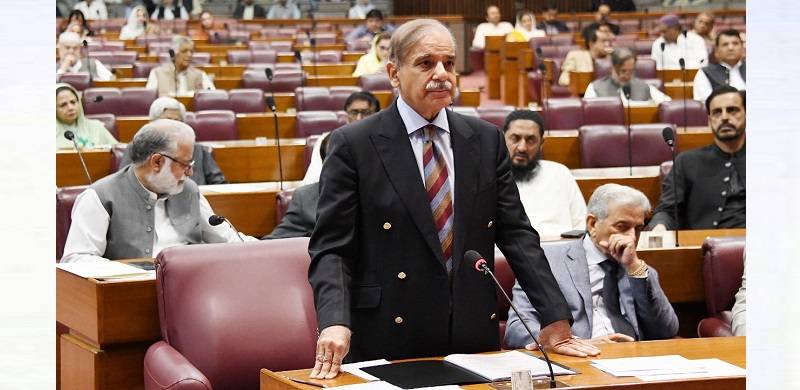
For the first time ever in the parliamentary history, a constitutional bill will not be implemented even after turning into an act of the Parliament.
Usually, the bill, after passing all the constitutional requirements is implemented soon as it takes the form of a law.
The political and constitutional crises have engulfed the country as the ruling clique attempts to limit the powers of the top judge.
The government twice rushed for the controversial legislation, titled the Supreme Court (Practice and Procedure) Act, 2023. This haste was observed when the top court took a suo motu notice of the ECP delaying elections in Punjab, the country's most populous province.
The bill was twice passed by the Parliament and interestingly, both the attempts were blocked by President Arif Alvi.
Alvi returned the SC bill to the Parliament for reconsideration as per the provisions under the Article-75 of the Constitution.
The apex court, observing the interventions in its power, came to the 'rescue' by using its 'constitutional authority'.
"It is therefore hereby directed and ordered as follows. The moment that the Bill receives the assent of the President or (as the case may be) it is deemed that such assent has been given, then from that very moment onwards and till further orders, the Act that comes into being shall not have, take or be given any effect nor be acted upon in any manner,” the apex court order issued last week, read.
The bench stated in its written order that prima facie the contentions raised disclose that there is a substantial, immediate and direct interference with the independence of the judiciary in the form of multiple intrusions, in the guise of regulating the practice and procedure of this Court and conferring upon it a jurisdiction that appears not to be permissible under any constitutional provision.
The judges noted, “Such intermeddling in the functioning of the Court, even on the most tentative assessment, will commence as soon as the Bill becomes the Act. Accordingly, in our view an interim measure ought to be put in place, in the nature of an anticipatory injunction."
"The making of such an injunction, to prevent imminent apprehended danger that is irreparable, is an appropriate remedy, recognised in our jurisprudence and other jurisdictions that follow the same legal principles and laws," it added.
It may be noted that if the president does not give nod to a bill within 10 days, the approval is deemed to have been given, according to the Constitution. According to the rules, “If the President refers back a bill to Parliament it is considered in a joint session and if passed by majority is deemed to have been passed by both Houses. Sent again to President to give assent in ten days failing which assent shall be deemed to have been given”.
The 10 required days for the SC bill completed today Friday (April 21) but it cannot be implemented till the court stay is not vacated.
Usually, the bill, after passing all the constitutional requirements is implemented soon as it takes the form of a law.
The political and constitutional crises have engulfed the country as the ruling clique attempts to limit the powers of the top judge.
The government twice rushed for the controversial legislation, titled the Supreme Court (Practice and Procedure) Act, 2023. This haste was observed when the top court took a suo motu notice of the ECP delaying elections in Punjab, the country's most populous province.
The bill was twice passed by the Parliament and interestingly, both the attempts were blocked by President Arif Alvi.
Alvi returned the SC bill to the Parliament for reconsideration as per the provisions under the Article-75 of the Constitution.
The apex court, observing the interventions in its power, came to the 'rescue' by using its 'constitutional authority'.
"It is therefore hereby directed and ordered as follows. The moment that the Bill receives the assent of the President or (as the case may be) it is deemed that such assent has been given, then from that very moment onwards and till further orders, the Act that comes into being shall not have, take or be given any effect nor be acted upon in any manner,” the apex court order issued last week, read.
The bench stated in its written order that prima facie the contentions raised disclose that there is a substantial, immediate and direct interference with the independence of the judiciary in the form of multiple intrusions, in the guise of regulating the practice and procedure of this Court and conferring upon it a jurisdiction that appears not to be permissible under any constitutional provision.
The judges noted, “Such intermeddling in the functioning of the Court, even on the most tentative assessment, will commence as soon as the Bill becomes the Act. Accordingly, in our view an interim measure ought to be put in place, in the nature of an anticipatory injunction."
"The making of such an injunction, to prevent imminent apprehended danger that is irreparable, is an appropriate remedy, recognised in our jurisprudence and other jurisdictions that follow the same legal principles and laws," it added.
It may be noted that if the president does not give nod to a bill within 10 days, the approval is deemed to have been given, according to the Constitution. According to the rules, “If the President refers back a bill to Parliament it is considered in a joint session and if passed by majority is deemed to have been passed by both Houses. Sent again to President to give assent in ten days failing which assent shall be deemed to have been given”.
The 10 required days for the SC bill completed today Friday (April 21) but it cannot be implemented till the court stay is not vacated.

